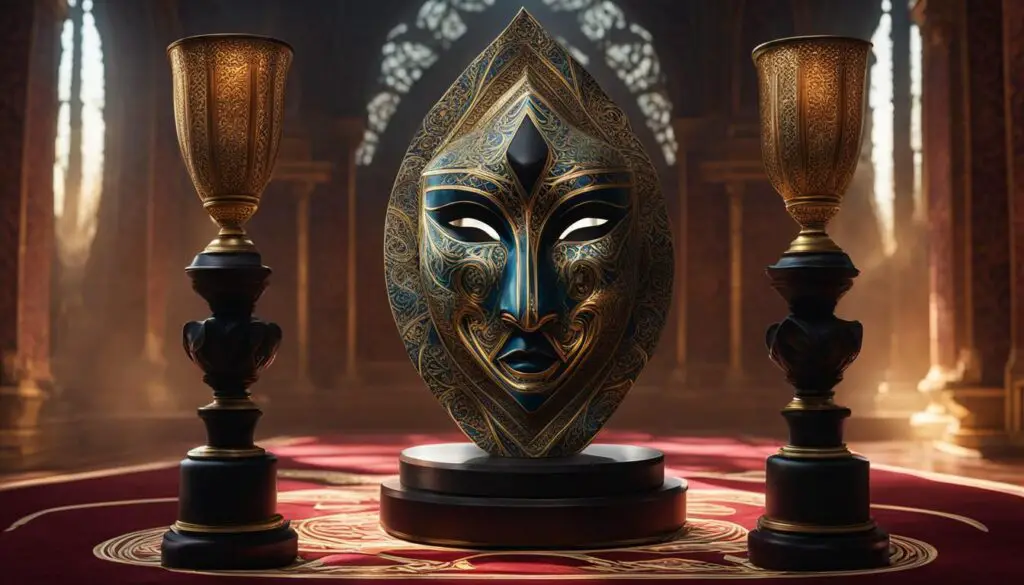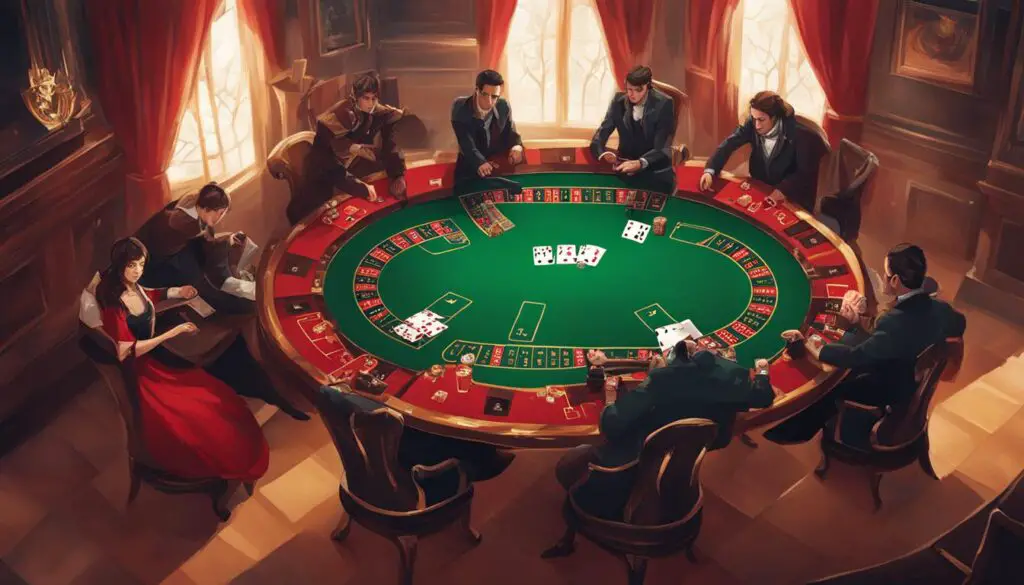Poker Night 2, a popular game among poker enthusiasts, seems to have disappeared from search results and online platforms. Fans of the game are left wondering why Poker Night 2 is unlisted and difficult to find. Let’s dive into the available data and explore possible reasons behind this mystery.
Key Takeaways:
- Poker Night 2, a beloved game among poker enthusiasts, is currently unlisted and hard to find.
- Fans are eager to uncover the reasons behind Poker Night 2’s disappearance from search results and online platforms.
- Exploring the available data may shed light on this intriguing mystery.
- Stay tuned for the following sections to uncover more details about Poker Night 2 and its unlisted status.
- It’s important to understand why the game is unsearchable, hidden, and missing to satisfy fans’ curiosity.
The Intriguing History of Illusionary Mask
In the early days of Magic the Gathering, a collectible card game enjoyed by players worldwide, one card sparked intrigue and mystery: Illusionary Mask.
Illusionary Mask, an alpha card released during the game’s early stages, introduced a hidden element to the gameplay. It allowed players to play cards face-down, adding an exciting layer of strategy and bluffing. This hidden information added a level of suspense and surprise to each move, requiring players to anticipate their opponents’ strategies.
However, Illusionary Mask presented unique challenges for the game’s rules team. Its mechanics required extensive rulings and adjustments to ensure proper functionality and balance. The card became known as one of the most unexplainable cards in Magic’s Alpha set, leading to a need for clarification and adjustments to maintain a fair and enjoyable playing experience.
The Honor System and Illusionary Mask’s Effect
One of the most intriguing aspects of Illusionary Mask in Magic the Gathering is how it interacts with the honor system that was prevalent in the early days of the game. The honor system allowed players to play face-down cards without revealing them to their opponents, adding an exciting element of mystery to the gameplay.
With Illusionary Mask, players could use a card like Crystal Rod to gain benefits from their face-down creatures, while opponents were left to try and target these creatures based on limited information. This created a unique dynamic where players had to carefully consider their moves and anticipate their opponents’ strategies.
To ensure fairness and maintain gameplay integrity, various rules and interactions were established. For example, combat resolutions had to be carefully considered when face-down creatures were involved, and the use of Clone cards added an additional layer of complexity. The result was a delicate balance that allowed for strategic gameplay while still preserving the excitement of playing with hidden information.
The Evolution of Illusionary Mask and Sixth Edition
As Magic the Gathering continued to grow and evolve, so did the rules surrounding face-down cards and Illusionary Mask. In the release of the Sixth Edition, significant changes were made to address the challenges posed by Illusionary Mask and provide a smoother gameplay experience for players.
In Sixth Edition, a fixed set of characteristics was assigned to face-down cards, eliminating the need for extensive rulings and adjustments. This simplification ensured that players could easily understand and follow the rules when playing with face-down cards like Illusionary Mask. The revised rules also introduced a concept known as Mass Cleanup, which allowed for easier management of face-down cards during the game.
Additionally, the Sixth Edition introduced the concept of transmogrify, which provided players with the ability to morph their creatures into different forms. This added another layer of strategy to the game, building upon the foundation laid by Illusionary Mask. The rules surrounding transmogrify and morphs were influenced by the experiences and lessons learned from the implementation of Illusionary Mask in earlier editions.

The evolution of Illusionary Mask and the rules governing face-down cards showcased the commitment of the Magic the Gathering team to provide a balanced and enjoyable gaming experience. By addressing the challenges posed by Illusionary Mask and incorporating new mechanics like transmogrify and morphs, the game continued to innovate and captivate players worldwide.
Alternate Reality Games and their Unique Terminology
Alternate Reality Games (ARGs) offer a captivating and immersive narrative experience that blurs the lines between fiction and reality. These interactive games utilize real-world platforms and transmedia storytelling techniques to engage players in a collaborative and challenging adventure. Along with their distinctive gameplay, ARGs also come with their own unique terminology that adds to the intrigue and excitement of the experience.
One of the key terms in the world of ARGs is the “puppet-master”. The puppet-master is the game designer or creator who orchestrates the entire ARG, crafting the storyline, puzzles, and challenges for the players to unravel. They are the creative force behind the game, pulling the strings and guiding the players through an intricate web of clues and mysteries.
Another essential term in the ARG lexicon is the “trailhead”. The trailhead is the starting point or entryway into the game. It is the initial clue or puzzle that players encounter, leading them into the immersive world of the ARG. The trailhead sets the tone and establishes the narrative, enticing players to embark on a thrilling journey filled with secrets and discoveries.
A fascinating term used in the ARG community is TINAG, which stands for “This Is Not A Game”. TINAG serves as a constant reminder that the ARG experience goes beyond traditional gaming. It emphasizes the blurring of boundaries between reality and fiction, encouraging players to fully immerse themselves in the game world and embrace the challenges and mysteries that lie ahead.
The allure of ARGs lies in their ability to transport players into a world where their actions and decisions shape the outcome of the game. The unique terminology adds depth and intrigue to the gameplay, further immersing players into the captivating narrative.
ARGs vs. Other Forms of Entertainment
Alternate Reality Games (ARGs) offer a unique and immersive experience that sets them apart from other forms of entertainment. While they share similarities with computer games, role-playing games (RPGs), and massively multiplayer online role-playing games (MMORPGs), ARGs have distinct characteristics that make them a captivating and interactive medium.
Unlike computer games, which are often confined to screens, ARGs extend beyond the virtual realm and incorporate real-life elements. Participants in ARGs become active players, controlling characters and making decisions in real time. This blurring of the lines between fiction and reality creates a sense of agency and engagement that is not found in traditional computer games.
Moreover, ARGs differentiate themselves from viral marketing strategies through their transparent approach. While viral marketing aims to create buzz and generate interest through covert tactics, ARGs openly acknowledge their fictional nature. Participants are aware that they are part of a constructed narrative and willingly suspend their disbelief to immerse themselves in the game’s world.

As ARGs continue to evolve, they push the boundaries of storytelling and player engagement. Their ability to seamlessly blend real-life and digital experiences sets them apart as a truly unique form of entertainment.
Sudoku: A Numerical Brain Teaser
Sudoku is a beloved number game that has gained popularity around the world. It is a logic puzzle that challenges players to fill a 9×9 grid with numbers from 1 to 9, following specific rules and limitations. The goal is to ensure that each row, column, and 3×3 subgrid contains every number exactly once. This seemingly simple game quickly becomes a complex brain teaser that tests your mathematical skills and problem-solving abilities.
With its grid of numbers and empty spaces waiting to be filled, Sudoku provides a captivating mental workout. It requires strategic thinking, logical deduction, and attention to detail. Each move you make affects the rest of the puzzle, forcing you to consider multiple possibilities and outcomes. As you progress through the game, you’ll find yourself diving deeper into a world of numbers, trying to unlock the solution to each puzzle.
Sudoku not only offers hours of entertainment and challenge but also provides numerous cognitive benefits. It improves concentration, memory, and focus while enhancing critical thinking and analytical skills. The satisfaction of solving a particularly tricky puzzle can be immensely rewarding and keeps players coming back for more. Whether you’re a math enthusiast or simply enjoy a good brain teaser, Sudoku is sure to provide you with endless hours of engaging fun.

Benefits of Playing Sudoku:
- Develops logical reasoning and problem-solving abilities
- Enhances concentration, memory, and focus
- Improves critical thinking and analytical skills
- Provides a relaxing and engaging mental exercise
- Boosts confidence and sense of accomplishment
The Journey of Sudoku: More Than Just a Game
Sudoku is not just your average brain game; it is a captivating journey that offers intellectual stimulation and a thrilling numerical challenge. This popular puzzle is more than a pastime; it is a tool for enhancing problem-solving abilities and providing a satisfying mental workout.
With its intricate grids and logical rules, Sudoku pushes players to analyze, strategize, and apply their numerical skills in order to solve each puzzle. The satisfaction of completing a Sudoku grid is unmatched, as it fuels a sense of accomplishment while sharpening your cognitive abilities.
Engaging in Sudoku regularly can have a lasting impact on your mental agility. It requires focus, attention to detail, and the ability to think critically. By incorporating Sudoku into your daily routine, you can improve your problem-solving skills, enhance your logical thinking, and develop a sharper mind.
So, if you’re looking for a game that goes beyond mere entertainment and challenges your intellect, Sudoku is the perfect choice. Embrace the numerical challenge, dive into the world of brain games, and unlock the potential of your mind. Get ready to embark on a journey that promises to transform you into a Sudoku virtuoso!
FAQ
Why is Poker Night 2 unlisted and difficult to find?
The exact reason for Poker Night 2 being unlisted and difficult to find is currently unknown. It could be due to various factors such as licensing agreements, changes in distribution platforms, or other unforeseen circumstances.
What is Illusionary Mask and its significance in Magic the Gathering?
Illusionary Mask is an alpha card introduced in the early days of Magic the Gathering. It brought a new element of bluffing and hidden information to the gameplay by allowing players to play cards face-down. It presented unique challenges for the rules team and required extensive rulings and adjustments to ensure proper functionality.
How did the Honor System and Illusionary Mask interact in Magic the Gathering?
The Honor System, prevalent in the early days of Magic, allowed players to play face-down cards without revealing them to their opponents. This system aimed to maintain the illusion and excitement of playing with a hidden element. With Illusionary Mask, players could use Crystal Rod and gain benefits from face-down creatures, while opponents could try to target these creatures based on limited information. Various rules and interactions were established to maintain balance and gameplay integrity.
How did the rules for face-down cards change in Magic the Gathering?
In Sixth Edition of Magic the Gathering, a fixed set of characteristics was assigned to face-down cards, simplifying the gameplay and addressing the challenges posed by Illusionary Mask. This allowed for a smoother experience, ensuring that players could understand and follow the rules without extensive rulings. The concept of face-down cards also influenced the development of other mechanics, such as Morphs, which provided new dimensions to the game.
What are Alternate Reality Games (ARGs) and their unique terminology?
Alternate Reality Games (ARGs) are interactive narrative experiences that utilize real-world platforms and transmedia storytelling. They involve intense player involvement and collaboration, blurring the lines between fiction and reality. ARGs have their own terminology, such as puppet-master (the game designer), trailhead (the starting point for players), and TINAG (This Is Not A Game), which emphasizes the immersive nature of these games.
How do ARGs differ from computer games, RPGs, and MMORPGs?
While ARGs utilize the internet as a central medium, they are not confined to computers and often involve real people controlling characters in real time. ARGs also differ from viral marketing strategies, as they strive to maintain transparency and acknowledge their fictional nature, rather than pretending to be independent consumers.
What is Sudoku and what skills does it test?
Sudoku is a popular brain teaser that challenges players’ logic and mathematical skills. This numerical puzzle requires the placement of numbers 1 through 9 in a grid, following specific rules and limitations. Sudoku tests problem-solving instincts and enhances cognitive abilities, making it a favorite among math enthusiasts and puzzle addicts.
What makes Sudoku more than just a game?
Sudoku transcends being just a game and becomes a journey that stimulates mathematical thinking and problem-solving abilities. It offers a stimulating and enjoyable workout for the brain, sharpening cognitive skills while providing a sense of accomplishment with each puzzle solved. Whether you’re a math geek or a puzzle aficionado, Sudoku is a must-try game that promises to push your mental boundaries and transform you into a Sudoku virtuoso.
